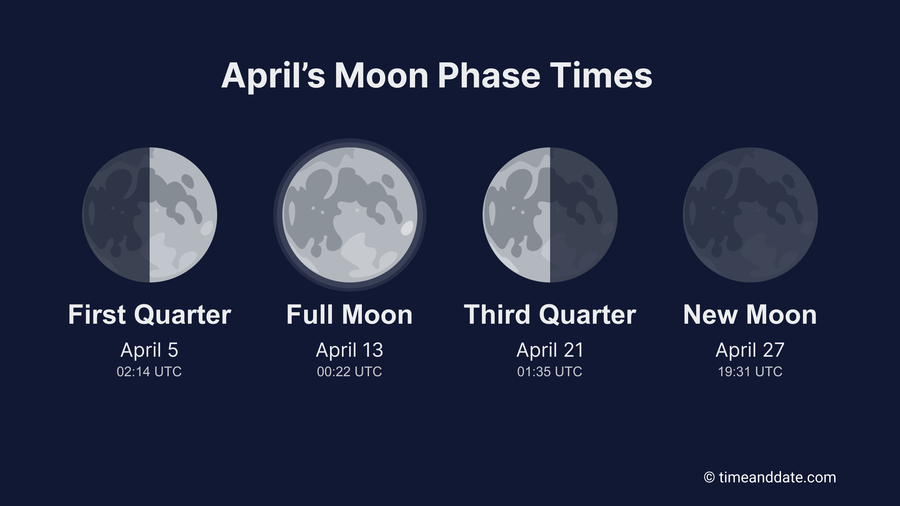
When to See the Full Moon in April
April’s Full Moon is at its most illuminated at 00:22 UTC on April 13, 2025.
The Moon always appears full in the days before and after peak illumination. Full Moon is the only phase where the Moon is up all night, with moonrise and moonset occurring around sunset and sunrise.
Moon Phase Times April 2025
| Moon Phase | Date | Time |
|---|---|---|
| First Quarter | April 5 | 02:14 UTC |
| Full Moon | April 13 | 00:22 UTC |
| Third Quarter | April 21 | 01:35 UTC |
| New Moon | April 27 | 19:31 UTC |
Moon phases are divided into primary and intermediate: Primary Moon phases happen at a specific moment in time, while the intermediate Moon phases occupy the times in between.

Smiley Face Moon in the Sky?
After sunset, around April 1, look west to find the Pleiades star cluster very close to the Waxing Crescent Moon. This cluster is also famously known as the Seven Sisters.
Looking east, just before sunrise around April 25, Venus and Saturn triangulate a Waning Crescent Moon. For some skywatchers it can look like a smiley face—like in Rio de Janeiro, Brazil. Or, even a grumpy face—like in Bangkok, Thailand.
Is it a Smiley Face Moon in your location?Explore the Moon in our Night Sky Map: Use the slider and calendar to view the Moon rise and set, as well as constellations, stars, and planets near the Moon.
A Micromoon and a Supermoon
The Full Moon on April 13 is a Micromoon, which means it is near the point in its orbit where it is farthest from Earth. At the moment of Full Moon, it will be around 406,007 kilometers (252,281 miles) away.
It won’t look any smaller. In fact, it may look bigger if you look at the Full Moon near the horizon because of an optical illusion known as the Moon illusion.
The New Moon on April 27 is a Supermoon, which means it is near the point in its orbit where it is closest to Earth. At the moment of New Moon, it will be around 357,136 kilometers (about 221,914 miles) away.
See where the Moon is right nowThe Full Moon in April is the Pink Moon
April’s Full Moon is known as the Pink Moon. It gets its name from the pink phlox wildflowers that bloom in the early spring. Native American names are the Breaking Ice Moon and the Moon of the Red Grass Appearing.
Common European names refer to the budding and birth of spring. The Celts had names like Budding Moon, New Shoots Moon, Seed Moon, and Growing Moon. The Anglo-Saxons called it Egg Moon.

